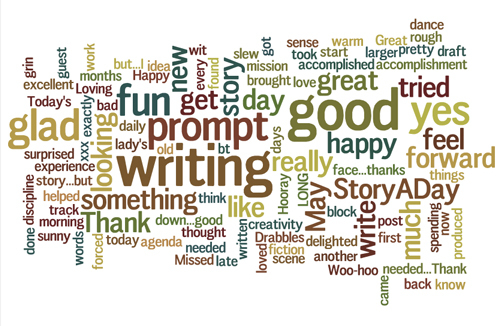Julie Duffy's Blog, page 81
March 14, 2020
160 – Creativity in a Time of Crisis
So we’re in a pandemic. Does that mean we have to stop being creative? Quite the opposite. The world needs more art, right now.
Ready to write today, not “some day”?
The post 160 – Creativity in a Time of Crisis appeared first on StoryADay.




March 13, 2020
How Can Our Community Help You?
The herd instinct is only a problem if you’re following the wrong herd.
Let’s see if we can put it to good use. Let’s circle the StoryADay wagons and help each other to write more of the stories that people need to hear—to distract them, to entertain them, to uplift and connect them.
Some things I’ve shared with people over the past few days
This is a wonderful time to catch up on your reading. Everyone has a pile of books they’ve been meaning to get to. Turn off the TV and open those books! If you can’t get to a writing group because you need to protect your health, ask other people to turn on the voice memo feature on their phone and record the group discussion for you. If you’re a member of a real-life writing group, ask the organizer to sign up for a free Zoom account. You can get everyone together for 40 minutes at a time under the free account, and chat about writing, or hold your critique meeting, or whatever you usually do.You don’t have to be writing fiction if it doesn’t feel right, just now. Write letters to friends you haven’t seen recently. Write journal entries. Work on a non-fiction project you’ve been meaning to get to. Advocate for a favorite charity or write postcards for a political candidate’s campaign.Use writing prompts to write tiny, throwaway stories that are only intended to amuse and distract yourself.
What other ideas do you have?
What can I do to help you?
Do you need an online writing hangouts this week, to keep you from obsessing about the news, or keep you sane while you work from home?Do you need daily SWAGr check-ins at StoryADay.org for the next week, to keep you accountable?Would it be helpful if I put together a bundle of links to the most popular articles on the site, so you can read something that isn’t virus-related?
Is there something else I can do to help you?
Leave a comment and tell me how you’re doing, and what you need. Also, if you’ve found something that helps you, please share that too!
The post How Can Our Community Help You? appeared first on StoryADay.




March 11, 2020
[Write On Wednesday] Pull Readers into Your Story
This month’s theme at StoryADay is “Show, Don’t Tell”, that pesky little piece of writing advice that sounds so easy and will actually take us the whole month to unpack. It’s more than simply ‘showing’. It’s about using all our senses to immerse the reader in a moment, and it come more easily to some writers than others.
Let’s start practicing with today’s prompt. This week we’ll focus on making the setting immersive. Next week will be about showing through dialogue. The week after that we’ll work on when to ‘show’ and when to ‘tell’.

The Prompt
Your character walks into a room and sees something/someone they really, really don’t want to see. How do they solve this dilemma?
Tips
While you’re writing this story, try to immerse the reader in the most emotionally-significant moments by taking us right inside your story.Don’t say “I walked into the large, well-kept formal dining room.” Try something like, “the clack of my heels on the hardwood floor echoed around the high ceiling. A crystal chandelier’s reflection winked at me from the polished dining table. I couldn’t smell the flowers that had been artfully arranged in huge gleaming vase, just silver polish and oil soap.” Be wary of weighing down the story with too much description though. Anything you spend this much time on should have emotional resonance. For example, I imagine the character in the above scene has a complicated relationship with an older relative who owns this house. All these features make her deeply uncomfortable, and my next sentence should show that. e.g. “I pulled at the collar of my blazer and made sure my skirt was straight. Aunt Sara would surely comment if it wasn’t.”In that sentence I added some action to convey the character’s feelings rather than telling you she was nervous about seeing the old battleaxe again.The thing they don’t want to see could be a spider, and alien, something that triggers them, something they’re scared of, something they thought they’d got rid of, something that tempts them…The person they don’t want to see could be an ex, a difficult family member, they person they just stole something from, their principal/priest/parole officer…
Try to include a few instances of this kind of “showing” in your story today.
Use the StoryADay Short Story Framework to map out what might happen in your story. Don’t have a copy of the Short Story Framework? Request it here.)
If you share you story somewhere (and here’s why you might not want to) post a link here so we can come and read it.
Leave a comment to let us know what you commit to doing today to nurture your inner writer: Write this story? Comment on this post? plan your next story? Read a great short story?
The post [Write On Wednesday] Pull Readers into Your Story appeared first on StoryADay.




March 7, 2020
159 – Talking About Creativity And Mental Health with Gabriela Pereira
 As well as running DIYMFA, Gabriela Pereira often speaks at conferences about issues other than the writing craft, including entrepreneurship and mental illness.
As well as running DIYMFA, Gabriela Pereira often speaks at conferences about issues other than the writing craft, including entrepreneurship and mental illness.
Today, we have a frank discussion about Gabriela’s history with mental illness as one part of a very full life that also includes running a business, having a family, and being a creative person.
We also talk a little about writing emotion when you struggle with your own.
(If you need help and live in the US, please text HOME to 741741. In Canada, 686-868, In the UK 85258. In the UK and Ireland, call 116 123. In Australia, call 13 11 14)
The post 159 – Talking About Creativity And Mental Health with Gabriela Pereira appeared first on StoryADay.




March 1, 2020
SWAGr for March 2020
Welcome to the Serious Writers’ Accountability Group!
Post your goals for this month and let us know how you got on with last month’s goals.

Leave a comment below telling us how you got on last month, and what you plan to do next month, then check back in on the first of each month, to see how everyone’s doing.
(It doesn’t have to be fiction. Feel free to use this group to push you in whatever creative direction you need.)
Did you live up to your commitment from last month? Don’t remember what you promised to do? Check out the comments from last month.
And don’t forget to celebrate with/encourage your fellow SWAGr-ers on their progress!
Download your SWAGr Tracking Sheet now, to keep track of your commitments this month
****
Examples of Goals Set By SWAGr-ers in previous months
Finish first draft of story and write 3 articles for my school paper. – CourtneyWrite on seven days this month – ClareExtend my reading and to read with a ‘writers eye’- Wendywrite 10,000 words – Mary Lou
So, what will you accomplish this month? Leave your comment below (use the drop-down option to subscribe to the comments and receive lovely, encouraging notifications from fellow StADa SWAGr-ers!)
(Next check-in, 1st of the month. Tell your friends!)
The post SWAGr for March 2020 appeared first on StoryADay.




February 29, 2020
158 – Writing Love & Intimacy with Dr. Lanae St. John
What are we really talking about when we talk about sex? Join me for a conversation with sexuality educator Dr. Lanae St. John. We talk about how to portray true intimacy on the page (without any weird noises), how to make consent sexy, and where to find a model for your next villain.
LINKS:
The Mamasutra – https://www.themamasutra.net/
Read Me: A Parental Primer For ‘The Talk’ – https://www.amazon.com/Read-Me-Parental-Primer-Talk
Ready to write today, not “some day”?
The post 158 – Writing Love & Intimacy with Dr. Lanae St. John appeared first on StoryADay.




February 22, 2020
157 – Gabriela Pereira from DIYMFA Part 1
We talk about the pillars of a writing life, why Gabriela wanted to create a do-it-yourself DIYMFA, and that old favorite: Imposter Syndrome.
Join me for a wide-ranging conversation with DIYMFA.com’s Gabriela Pereira. She is a speaker, podcast host for DIY MFA Radio, and author of the book DIY MFA: Write with Focus, Read with Purpose, Build Your Community.
To find out more about DIYMFA’s flagship course (enrolling new students now) go to https://members.diymfa.com/sdsd/
Ready to write today, not “some day”?
The post 157 – Gabriela Pereira from DIYMFA Part 1 appeared first on StoryADay.




February 18, 2020
[Write on Wednesday] Trouble In Paradise
Relationships are tricky – romantic or otherwise – because at the heart of each relationship are two individuals who have expectations, often unspoken, about what they owe to each other.
 Photo by Jessica Da Rosa on Unsplash
Photo by Jessica Da Rosa on UnsplashThe Prompt
Write a story in which two close friends, lovers or family members struggle through a difficult moment.
Tips
Love relationships are based on certain expectations (for more on that, see last week’s post about the types of love, what forms them, and how they can go wrong). Conflict arises when one party’s expectations aren’t met, and when they feel betrayed or disappointed.
Conflicts between people who love each other ought to be easily solved. All we have to do is follow a script written by a relationship therapist, and all will be well, right? Of course not!
Think about the things that can go wrong after the initial ‘insult’. Perhaps the aggrieved party responds with anger, irritation, sarcasm, triggering something in the other person. Perhaps the aggrieved party says nothing at all and allows the insult to fester. Perhaps the person who upset them is absolutely clueless.
You could write a story in which a wound like this breaks a couple up and it is only decades later, that the other person finds out why the relationship failed.
Or you could write a story in which a couple try to fix a problem only to make it worse, try again, make it worse again and then, if you’re an optimist at heart, you could let them have a moment of humility, when each realises what they’ve beem doing wrong, and fix it.
These relationships could be friendship, romances, or work relationships. Think about what’s at stake in each. For example, in family relationships you’re kind of stuck with each other and have to make it work (or upend your whole family structure), whereas friendships can be relatively ‘easy’ to leave behind.
If you share you story somewhere (and here’s why you might not want to) post a link here so we can come and read it.
Leave a comment to let us know what you wrote about today, and how it went!
Ready For More?
Take The 3-Day Challenge
The post [Write on Wednesday] Trouble In Paradise appeared first on StoryADay.




February 15, 2020
156 – What To Do When You’re Bored With Your Writing
Sometimes what used to work for us no longer works.
In this podcast I talk about the benefits and downsides of your writing commitments, I encourage you to scare yourself, and I revisit the subject of habits, and check in to see how you’re getting on.
Also: I preview some coming changes to the podcast
LINKS:
The StoryADay Short Story Framework, in case you want to write a story today but aren’t sure how to get started: https://storyaday.org/framework
The StoryADay 3 Day Challenge, in case you need a little extra accountability and you work best with a curriculum: https://storyaday.org/3DC
Ready to write today, not “some day”?
The post 156 – What To Do When You’re Bored With Your Writing appeared first on StoryADay.




February 11, 2020
[Writing Prompt] What The Greeks Knew About Love
This year during the Superbowl I noticed an ad that used the different types of love, as defined by the Greeks, to advertise their product. And it reminded me that, for those of us without a classical education, it can be useful to review frameworks like this, that underpin our cultural attitudes whether we know it or not.
 Photo by Thomas Vogel on Unsplash
Photo by Thomas Vogel on UnsplashThe Prompt
Write a story combining featuring two different types of love relationships from the list. Notice how they interact, how they cause the characters to act, and where those actions are different and similar.
Types of Love
Storge– best described as an empathy bond or ‘affection’, such as the love between a parent and child, or between siblings or other extremely close relationships. It’s a love that is founded in familiarity, and may not have much to do with whether the people involved actually like each other.
The positive aspects of this type of love are that it takes no effort, is not earned, can be counted on.The negative aspects are that it can become too familiar, too expected, a harmful obligation, and that it can be corrupted by jealousy or familiarity.
Philios- this form of love is rooted in friendship. It might be as strong as a familial bond, but is rooted in things other than familiarity. It is typically formed because people have similar values, shared interests and activities. It is typically a love that is chosen rather than imposed (storge) or irresistible (eros).
The positive aspects of this type of love are that it is chosen, you’re never obligated to continue these relationships, and that they tend to thrive on companionship.The negative aspects can include a tendency to become cliquey and exclusive. They may take precedence over other, more socially-minded obligations.
Eros – this is romantic love, the one we are most often accustomed to seeing in movies and books. It arises from the feeling of ‘being in love’, which is not necessarily about sexual attraction, but about that exciting infatuation we get when we first begin to adore someone. It tends to be very physical (that euphoria! The racing heartbeat! The endorphins!), and focused. It really does feel like the rest of the world falls away when we see the object of our affection. It feels like it is imposed by some outside force, not a conscious act.
The positive aspects of this type of love are that it is can lead to procreation, that it can mature into a deep bond that becomes familial and that it is an extremely profound, all-encompassing experience.The negative aspects are that its extremity can lead to unhealthy obsession, jealous, even a disdain for the person even while you are physically attracted to them. It can be the source of some of the most terrible things people do.
Philautia – This is about love for one’s self.
The positive aspects of this type of love are that we all need self-respect to thrive. Compassion for oneself can manifest in many ways, from eating well and resting enough, to treating ourselves to little presents.The negative aspects of this are, of course, all about ego and vanity and self-obsession. Social media certainly offers us plenty of settings for the dark side of this love.
Agape – This is a selfless love that exists regardless of changing circumstances. In the Christian era it has been assigned to the love of God for humanity, but in the Greek sense it was an expansive, selfless love that might be found in some of the other relationships listed above. I can certainly see many settings in the modern world the offer opportunities to tell stories involving agape, from families and friend groups to nursing homes, charities and workplaces.
If you want to inject a little hope and optimism in any story, show us characters with a little agape.
If you share you story somewhere (and here’s why you might not want to) post a link here so we can come and read it.
Leave a comment to let us know what you wrote about today, and how it went!
Ready For More?
Take the 3 Day Challenge
The post [Writing Prompt] What The Greeks Knew About Love appeared first on StoryADay.







